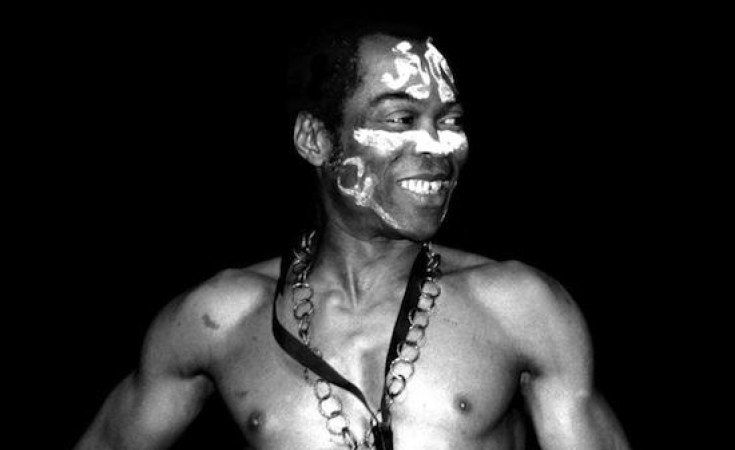Knitting Factory Records are reissuing 10 Fela Kuti albums. Clyde Macfarlane explains some of their original political messages.
As part of a big year for Fela Kuti - the late activist and afrobeat pioneer - Knitting Factory Records are re-releasing a second batch from his sprawling discography. Most of the 10 CD's here feature double albums - the typical format for Fela Kuti.
The first is 1976's Ikoyi Blindness/The Kalakuta Show, a celebration of Fela's self-proclaimed republic in the heart of Lagos. 1977's Zombie, probably both Fela's best known song and album, was Fela's wry criticism of the Nigerian army.
In retaliation, armed troops attacked the Kalakuta Republic later that year. One of the victims was Fela's mother, Funmilayo Ransome Kuti. This did nothing to suppress Fela Kuti's voice, as can be heard on the 1979 song 'Unknown Soldier'.
To a female backing chorus of:
"Order!"
"Left right, left right, left right!"
"Stand at ease!"
Fela narrates his account of the events:
"One thousand soldiers them dey come
People dey wonder, dey wonder, dey wonder
One more time: people dey wonder, dey wonder, dey wonder
Stevie Wonder dey there too
Na one week after FESTAC too
And dey broadcast on American satellite"
It was at Lagos's Festival for Black Arts and Culture (FESTAC) that Fela first played 'Zombie'. The festival was intended to celebrate African pride, many African nations having recently been liberated from colonialism; it was the motivation for African American artists like Stevie Wonder, Sun Ra and Donald Byrd, and the Afro-Brazilian Gilberto Gill to travel to Lagos.
For Fela, FESTAC was just another stage on which he could commentate on a far from perfect Nigerian government. A mindless and armed "zombie" made as dangerous a FESTAC security guard, Fela suggested, as he would make a mindless soldier.
"Around that time too now, I say to you
Where these one thousand soldiers them dey go?
Look o
Na Fela house Kalakuta
Them don reach the place, them dey wait
Them dey break, yes
Them dey steal, yes
Them dey loot, yes
Them dey fuck some of the women by force, yes
Them dey rape, yes
Them dey burn, yes
Them commot one student's eye, yes
Them throw my mama... "
Funmilayo Ransome Kuti was one of Africa's leading social activists. Among numerous successes unrelated to gender issues, her achievements for women's rights included helping to abolish Nigerian gender-segregated tax rates in 1953.
Whilst afrobeat contradicted many of her ideals by overtly sexualising women, the Kalakuta had become her adopted home, and Fela used language in a way that gave the brutality of the attack nowhere to hide.
"... Seventy-eight-year-old mama
Political mama
Ideological mama
Influential mama
Them throw my mama out from window
Them kill my mama
Them kill my mama."
Then came the titled "unknown soldier", a quote from the official police report of the Kalakuta burning, which pronounced the Nigerian army innocent. An "unknown soldier" was blamed despite all evidence - the obstruction of the fire brigade by the army, for example - pointing towards a co-ordinated attack from senior officers.
Surely an unknown soldier, Fela proposed, was Olusegun Obasanjo's faceless manifestation of an unknown government. Obasanjo became the subject of Fela's unflinching 1979 release Coffin for Head of State.
"I say unknown police
And then unknown soldier
And then unknown civilian
All is equal to unknown government",
explained Fela on 'Unknown Soldier',
"Them turn green into red
Them turn blue into white
Them turn green into blue
I'm finished, mother."
This was Fela Kuti at his most explosive, guiding the listener through the rise, fall and spiritual re-birth of his Kalakuta Republic over three huge years.
From The Kalakuta Show to Coffin for Head of State via Zombie, Unknown Soldier, the lesser known but equally brilliant Stalemate and 15 other albums, Knitting Factory's most recent re-releases will surely be the most important to the Fela Kuti story.
The 10 CD's are re-released by Knitting Factory Records.


